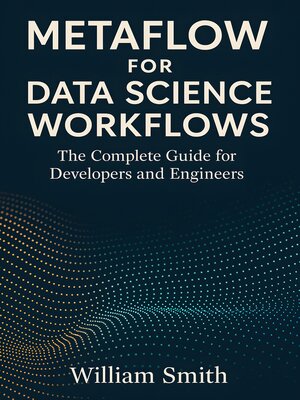Metaflow for Data Science Workflows
ebook ∣ The Complete Guide for Developers and Engineers
By William Smith

Sign up to save your library
With an OverDrive account, you can save your favorite libraries for at-a-glance information about availability. Find out more about OverDrive accounts.
Find this title in Libby, the library reading app by OverDrive.



Search for a digital library with this title
Title found at these libraries:
| Library Name | Distance |
|---|---|
| Loading... |
"Metaflow for Data Science Workflows"
"Metaflow for Data Science Workflows" is an authoritative guide to building, managing, and scaling modern data science workflows using the Metaflow framework. This comprehensive book opens with a critical analysis of the evolution of data science pipelines, examining the challenges of reproducibility, scalability, and complexity that confront today's practitioners. Readers are introduced to the transformative potential of orchestration tools within MLOps and DataOps, placing Metaflow in context through in-depth comparisons with Airflow and Kubeflow, while establishing a strong foundation in core concepts such as Flows, Steps, Artifacts, and the Directed Acyclic Graph (DAG) paradigm.
Spanning Metaflow's robust architecture and its integration with cloud and enterprise environments, the book delves into technical mechanisms essential for workflow composition, dynamic branching, parallel execution, and advanced artifact management. It empowers readers to develop resilient, production-ready data pipelines through best practices in parameterization, modular step design, error handling, and collaboration. Extensive attention is given to scalable deployment strategies—from local testing to distributed cloud execution on AWS, Kubernetes, and serverless platforms—and to maintaining fault tolerance, cost efficiency, and regulatory compliance at enterprise scale.
The discussion extends beyond theory with practical guidance on experiment management, CI/CD integration, and operational monitoring, ensuring reproducibility and traceability through versioning, tagging, and comprehensive audit trails. Real-world case studies, patterns for hybrid and multi-cloud orchestration, and insights into emerging trends position this book as an indispensable resource for data scientists, engineers, and technical leaders seeking to implement robust and future-proof data science workflows with Metaflow.







